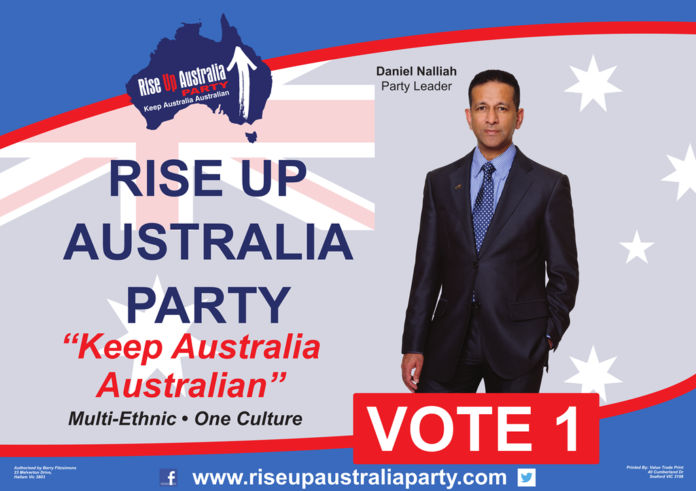Rise Up Australia states that the party exists to “keep Australia Australian”. They want to maintain Australian jobs, ownership, and traditions. Here are some policies that caught my eye.
Instead of using the buzzword, “multicultural”, they want to build a melting-pot nation, with one culture composed of many cultural elements brought by our immigrants. The key here is assimilation into Australian society.
Just as a quick aside, this is how Australian culture has been built for many generations: migrants saw a land of opportunity, came to build a better future for their children, and brought their culture with them. Often their culture was what gave them business opportunities, which also gave Australia as a whole that richness of a melting-pot society.
To this end, RUA do not support Sharia law, stating that, “it is incompatible with our democracy and in particular curtails the civil rights and freedoms of women.”
A major policy is their hold to freedom of speech and religion – this is unsurprising, considering that their leader, Daniel Nalliah, was one of the “Two Dannys” in the court case over the Religious Vilification Act. I would like to point out that the Two Dannys won that case, and RUA is working to ensure freedom of speech is maintained for all.
This includes such things as resisting the push to ban public Christmas trees and carols – which may seem like a small thing, but to outright ban things that have been traditions in Australia for generations is to cut out our own culture.
Free speech, as pointed out in the video on RUA’s website, is expensive, and can be offensive, but it is worth the price. See here for the full spiel. I back the right of every person around me to insult me if they so choose, because freedom is more important than preventing offense.
Their immigration policy involves stopping ALL illegal boats, in order to send people-smugglers the message that Australia can’t be breached by such dangerous means. However, although their website mentions encouraging refugees to use the proper channel, there is nothing about how they intend to make that easier.
They believe in a big Australia (recognising, as mentioned above, that Australia is built on immigration), and aim to encourage private-sector jobs and local manufacture. Again, though, they have very little detail as to how they intend to do so, save two.
To combat cheap imports from countries with lower-valued currencies, they want to increase tariffs. Now I’m quite aware that doing so will increase consumer prices on many common items, and I use those cheap-imports shops quite a bit. But I am willing to accept these price rises to allow fairer competition. I will pay that 50 cents extra on a $2 item, or whatever it ends up being, because I want that money to allow some young Australian to get out of the jobless situation I’ve been in for so long, and work in manufacturing.
The other part of encouraging local industry is small-business incentives. The thing I note here is their acknowledgement that there is no such thing as a quick fix. As noted by George Gilder of Prager University (reference: Why Capitalism Works), 50% of business start-ups fail within four years. But in the long run, this is what builds a country’s economy.
RUA would like Australia to be “self-sufficient in crude oil, being a net exporter of all forms of energy” – but again, they don’t say how. I point, however, to Keating’s recent article Confessions of a Capitalist, because I believe innovation can go a long way, even if it takes time.
Now I’m happy to accept these concerns, because they can’t put every detail of their policies on their website. But I do have one major concern: their economic policy.
The tax reform they propose is to throw out the whole lot, and replace it with a Goods and Consumables Tax and a debit tax on spending.
Now they have estimates that the debit tax alone will double government revenue, but nonetheless I am concerned.
Firstly, I am concerned about the throwing out of the entire existing system (with the exception of taxes on import/export etc). If their new system doesn’t fulfill its promise, will we be able to easily switch back? At least we know what we’re dealing with in the existing system, even if it is hugely complicated.
Secondly, reasons that it might not fulfill its promise. If the debit tax is supposed to double government income, won’t that mean costs of all spending will go up more than people get back from not paying the old taxes? And if costs are likely to rise like this, would it actually be possible to implement the two taxes as they are proposed, or would the figures have to be reduced? If the figures are reduced, will the two taxes still pay for all the proposed expenditure?
Uncertainty, both of such a drastic change itself and of how the proposals are bound to morph before they could be implemented, are my main concerns here.
Overall, I believe this is a party with good values, who are not blind to the real concerns facing Australia.










